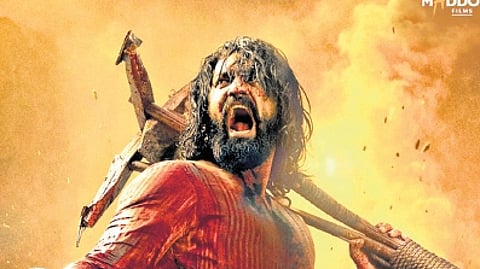

These days, the benchmark to judge military actioners and period dramas is quite low. It’s a relief if Pakistanis and Mughals are portrayed as characters and not caricatures. Ok, this isn’t just chest-thumping. This is a story. As a reviewer, while watching Chhaava, I bask in this realisation for a little too long.
The film earns my praise only because it is competent. The production design doesn’t look cheap, the cinematography is decent and the film doesn’t confuse praise for one with the vilification of the other. There is an attempt to understand a historical figure even if it is oftentimes scattered and unimaginative. But all possibility of nuance is soon lost to noise. Loud and proud, Chhaava adulates its subject to a level that it becomes more plain than profound.
Based on the Marathi novel Chhava by Shivaji Sawant, the film chronicles the period in Indian history from 1681 to 1689. After the demise of Chhatrapati Shivaji Maharaj, the Mughals, headed by Aurangzeb (Akshaye Khanna), are quick to write off the Maratha Empire.
Unbeknownst to them, Shivaji’s eldest son, Sambhaji (Vicky Kaushal), has taken up the baton. Sambhaji’s bloody conquest of Burhanpur, a key town for the Mughals, sends ripples across Delhi. An angered Aurangzeb vows revenge and begins his conquest of Deccan, where his humongous army faces stiff resistance from the outnumbered but spirited Marathas.
Chhaava, however, is told in a templated way. You have a king whose personality is reduced to just valour. There is a devoted wife, an evil rajmata and backstabbing courtiers. Every war obstacle is solved by chanting ‘Jai Bhawani’.
This could have been a tale of any Rajput warrior. Battle set pieces are set in novel locations like a marketplace, a jungle and sugarcane fields, among others, but the action choreography is banal. The action never escalates and is often wasted on slow-mo shots of Sambhaji flexing his might. In the second half, the battle sequences are paraded one after the other like a montage, making them exhausting and predictable. Sambhaji swings from treetops, bursts out of the ground, jets out of a lake, and it’s all, meh.
The Laxman Utekar directorial falters even more in the calm scenes. The dialogues are wordy and flowery and seem like they are ripped off from a script for a school play. Characters are only surface-level, and there is no scope for complexity. Chaava doesn’t know how to rouse emotions if not for blaring BGM, religious chants or just sheer screaming.
Vicky Kaushal, however, understands the assignment. He roars like a lion (even fights one) and gives a convincing, if not exemplary, performance. The scene stealer, though, is Akshaye Khanna. His Aurangzeb is meditatively menacing, and he says more with his icy gaze than the others do with all their raucous war cries.
Rashmika Mandanna as Maharani Yesubai gets more agency than queens do in films titled after kings, but it still is just serviceable. Divya Dutta as the rajmata and Neil Bhoopalam as Aurangzeb’s son Mirza Akbar leave a mark even in their brief screen time.
Their character journeys don’t do justice to their acting prowess. Vineet Kumar Singh as Sambhaji’s ally Kavi Kalash is an able performer, but his performance loses out to unnecessary theatrics. The biggest waste, however, is Ashutosh Rana as Sarsenapati Hambirao Mohite. He is reduced to a mere loyalist whose death, although played to amp up the emotions, doesn’t even register.
After a meandering start and a middling middle, Chhaava leaves some impact by the climax. Vicky’s Sambhaji batters a sea of Mughal soldiers with a log, and although it seems like a scene from a zombie apocalypse film, it boasts of scale and filmmaking.
His subsequent torture by Aurangzeb, although true as per popular history, is grotesque and stretched. Days and nights pass as a bloodied Sambhaji stands in chains like a biblical Jesus. His nails are ripped off, and his eyes are gouged out. But you don’t feel his pain. There is no sympathy nor a stirring sense of patriotism. There is just exhaustion.
Chhaava
Cast: Vicky Kaushal, Rashmika Mandanna, Akshaye Khanna, Diana Penty, Ashutosh Rana, Vineet Kumar Singh, Divya Dutta
Director: Laxman Utekar